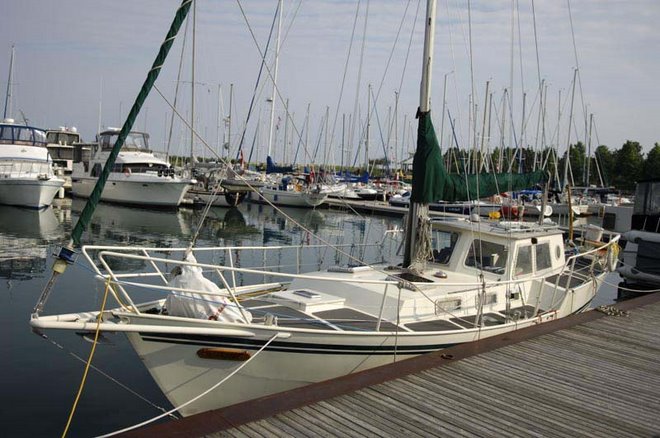 |
| King Neptune: May require occasional appeasement; sacrifices, perhaps some episodes of transvestism. |
The fine author over at Boat Bits had last spring a small note on cruiser conformity. I've had reason to reflect upon the topic of late. I believe it's a truism that even self-proclaimed non-conformists like cruisers actually prefer company...particularly company backed by the bland, Taco Bell-like strains of Jimmy Buffett, although this affliction is not universal.
You can guess my feelings on the faux-piratical works of Mr. Buffett.
 |
| Rule of thumb: the more elaborate the hat, the more suspect the religion. |
But it's true, insofar as myths go: Cruisers often feel they have broken free of the pack by their choice to cruise. Some even crow about it. It's part of the self-mythologizing of the modern cruiser. It's self-mythologizing in the sense that if you go to sea with all mod cons and are in constant touch via nine kinds of gadget to loved ones and other lubbers. It's self-mythologizing if your boat is on Spot, Marine Tracker and cruises in convoys like ARC. If, to mangle Vera Lynn, you'll never sail alone, are you really blazing a path of individuality through the pitiless waves at the ends of the oceans?
Not that one must, of course. After all, others went before all of us, when it was a lot harder.
Please note there's nothing wrong with this self-image of ruggedness: there's no reasons whatsoever that those who've worked hard to actually get onto a well-found boat (if today's production cruisers can be judged as well-found) should not enjoy their time as they see fit. And, arguably, it's a lot of work to live full-time on a boat, and for most sailors, the amenities are all the sweeter because they often involve more labour than is customary in, say, a new condo. It's just somewhat cognitively dissonant to some, and I am among them, that "cruisers in clusters" should wish to trade one commute (to work and back) for another (to the beach bar and back). The "cruiser lifestyle" so prominent in Mr. Buffett's oeuvre can devolve into a clubby boozefest with lashings of infidelity...or so some tales told have suggested.
 |
| For some, it's a sundowner, for others, a way of life. |
Of course, it hasn't escaped my attention that this aspect of "cruiser culture" is just a sunnier, sandier version of some local YCs of which I've darkened the doors. The boat, and the sailing, often seem secondary to the activity within the communal tree fort of Permatan Bay. Like attracts like. No mystery there. But being too long among a bunch of self-declared non-conformists (cruisers who've "stuck it to the man" by sailing away from the ol' nine-to-five) can itself grow conformist. It may be something to keep in mind: a sort of "I didn't come 9,000 NM to hang out with the cast of a Freedom 55 commercial" refrain to ward off complacency.
 |
| Stock figures: Fifty-five and white is no way to go through life, son. |
Now, unless you have been given a free boat and possess a marketable skill (and most skilled people tend to overestimate the "marketable" part), you have to be at least affluent to go cruising in the first place (or that is the general perception), and so former wage slaves with three pensions tend to rule the waves. The same well-serviced demographic can be frequently found spouting off libertarian and/or hippie sentiments while smuggling a disassembled Mossberg in the headliner "just in case". It's funny how a realistic evaluation of how others should act is often the first casualty of material success. Not exclusively, mind you: I've known of a few sailors who have integrated charitable works and educational endeavors into their cruising life, and have "good works" scribbled on their boat's "to do" list, and more power to them for it. But if poor people are annoying, why go to poor countries? Why go to poor countries just to cluster among people just like oneself? One answer is that, with not many exceptions, the reality is that most people who can afford to cruise in the first place are from generally pasty countries where there is a tradition of doing so. Yachting, after all, didn't really exist until aristocrats invented it, and it's trickled down to the upper middle class in the intervening centuries. There are exceptions, of course: people can get cheap or free cast-offs or can made boats out of rubbish and salvage with little but skill and time...but they tend not to sport parrot-themed headgear. Thankfully, I think.
Clearly, the sailing life, whether one is a Napoleonic Era naval re-enactor or the purchaser of a new Beneteau Sense 46, is at heart a conservative one, if not necessarily in the political sense. Techniques and materials are tested and discarded over decades and even centuries in the harsh light of the verdict of the sea: if a way of doing things is inappropriate or ill-suited for its purpose, the very waters and winds will make short work of them, and possibly make shorter work of the venturesome sailor that precipitously employed them.
What may have been lost is the sense is just how selective that conservatism can be, and how for many a sailor such selectivity may be, sometimes, a dead end. We sailors took to Dacron in the 1960s over "traditional" canvas sail material and manila lines because Dacron was superior in nearly every respect: it didn't predictably rot in sunlight and was predictably stronger. We are beginning to shift from steel wire shrouds and stays to PBO rigging and "soft shackles" for the same reason: greater strength, more resistance to "rot" and less weight aloft.
One could say similar things about modern anchor designs, daggerboards, electric auxiliaries and even the sort of things I have been known to make light of, like steering via iPhone or a wristwatch. All new techniques have, in the conservative sailorly mind, not only a battle to establish their intrinsic worth, but a fight against the stolid inertia of sailors when it comes to adapting new techniques, technologies and materials...given that the older techniques, technologies and materials work quite well enough, thank you very much. Dad's CQR is barely rusty!
This is not in itself to be derided: sailors are thrifty by nature and necessity and like to think of themselves as self-reliant and, returning to the realm of myth, perhaps tied to the mast gazing steely-eyed into the face of the tempest. This sort of self-mythologizing goes back to Odysseus, and maybe further, of course. But sometimes the "good enough for Cap'n Grandad" mindset can be a set of blinders to the opportunities of improving one's seamanship or expanding the contents of John Vigor's black box of prudent preparedness.
 |
| Don't leave shore without it. |
Even the most rugged of invididualists, and sailors tend to think of themselves as pretty independent, boot-strappy types, can forget that we've spent 99.9% of our evolution in small, mobile groups in which innovation was, at best, incremental, and princely solitude usually turned one into dinner. So the myth of the lonely skipper (or the tiny brave crew on the tiny stout vessel) alone against the raging sea with fids in teeth and lengths of jute stuffed into belts is only so if you really work hard to ignore the last 100 years or so of technology.
One needn't be alone today at sea. One can be, of course, and more power to the truly self-sufficient sailor out of easy contact with land and all its snares, but now it's a choice.
This does not obviate or lessen the reality that skipper decisions must still be made, should crises intrude on the voyage. Decisive and prompt actions (and the consequences of same) will likely remain a big part of cruising until such time as crew (and boat?) can be beamed out of the tempest, Star Trek-style.
So perhaps it's time for some new myths to which the sailor can aspire.




